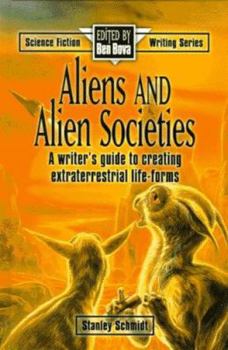Aliens and Alien Societies
(Part of the Science Fiction Writing Series Series)
Teaches writers how to use real scientific knowledge of our universe to create more convincing extraterrestrial life forms in their science fiction or fantasy novel. This description may be from another edition of this product.
Format:Hardcover
Language:English
ISBN:0898797063
ISBN13:9780898797060
Release Date:January 1996
Publisher:Writer's Digest Books
Length:226 Pages
Weight:1.11 lbs.
Dimensions:0.9" x 6.2" x 9.3"
Customer Reviews
5 ratings
Do you have to be a professor or PhD to write Science Fiction?
Published by Thriftbooks.com User , 18 years ago
The answer is no ... or yes, depending on what form and/or market your writing is goaled toward. If a science fiction novel was written to include every element presented in this manual, it would be as boring as reading a detailed summary of how to climb a step ladder. If you get too lost in the guidelines, you'll lose your creativity. A being with rubbery skin can live on a wet planet, but you don't have to detail that being's evolution from primordial ooze to rubber man down to the details of its DNA. Writing "hard" science fiction is much different from writing "fantasy" science fiction, or "softer" science fiction. Mieville's cactus people wouldn't exist if he'd followed the restrictive rules of hard sci-fi, and they are intriguing. Mieville didn't build a world with climate, rotation, axis position, mean distance from a sun, the type of sun, or any other hard facts, he just made his species absorbable and intriguing. The presumption that even "hard" science fiction is for mathematicians, physicists, professors, scientists, and total numbers-geeks is preposterous and insolent. You'll have to ask yourself, as a writer, "how far do you want to go?" Are you writing science or science fiction? Is this a thesis or compelling imagery? Schmidt pointed out that certain people write in to the publisher when the hard facts are shaky, but remember that these are guys portrayed by the "comic book guy" in The Simpsons. Do you cater to the few who don't have a life or do you use your creative talent to entertain the majority? Even one of the stories mentioned by Schmidt, Stanley G. Weinbaum's "A Martian Odyssey" didn't follow such strict guidelines as Schmidt presents, and still created one of the most intriguing aliens to have ever graced the written word. Weinbaum didn't explain Tweel's evolution, or any evolution on Mars, he didn't explain the rocket propulsions or the thermal sleeping bags or the reason Earth beings went to Mars, but he created a story that holds intrigue throughout many generations and is classified as "hard" science fiction (with humor). Heinlein rarely went into the details described in this book, nor Norton, but they are still classic Sci-Fi writers. Both Star Trek and Star Wars have broken apart Schmidt's theory of "necessary fundamentals". Actual "writing about aliens" doesn't start until chapter eight, continuing through chapter nine. Many readers may give up before then. Science Fiction (IMHO) 'supposedly' takes for granted the fact that warp travel, or faster-than-light travel is accepted, I find no need to extrapolate a hard-science based core for this, whereas the author seems to think it's mandatory. I honestly don't believe the modern science fiction reader requires an extensive physics lecture to believe in faster-than-light travel. Still, this book, IMHO, should be required reading for anyone who writes "hard" sci-fi or "fantasy" sci-fi. While the physics of the writing may seem overwhelming, the id
What is Alien?
Published by Thriftbooks.com User , 23 years ago
I don't feel this is the strongest book in the Science Fiction Writing Series, but it is still a good resource. The book isn't a step-by-step "How to Create Aliens" guide, so you might be disappointed if you buy it for that reason. It is more a book to help you "rethink" what you consider alien and opens you up to ideas about what makes a being/society alien to us as humans.
Hmm...Interesting
Published by Thriftbooks.com User , 25 years ago
It's generally considered impossible and absurd to write the perfect book on imagination. That's exactly what "Aliens and Alien Societies" is all about. This should not be taken as a book of guidelines on how to use your imagination. It simply gives you scientifically-believable ideas on how to make aliens that you come up with a bit more plausible.
Worthwhile but short on detail
Published by Thriftbooks.com User , 25 years ago
This is a good overview of the basics of realistic SF aliens. However, I found it a bit too basic, and wished for more specifics. But the subject matter is just so broad and protean that anything more than a general overview like this would be very hard to achieve. Perhaps the most valuable portion of the book is its bibliography, referring the reader to numerous fiction and nonfiction works offering more detail. In many ways, this is as much a guide to the mechanics of writing about aliens as to the physics, psychology etc. of designing them, and it contains some good insights. I found the chapter on alien languages pretty interesting. Overall, it's certainly a useful reference, though I'm sure that supplementing it with works from the bibliography is necessary to get a fuller picture.
Fascinating guide to help any science fiction writer.
Published by Thriftbooks.com User , 28 years ago
Excellent review of important considerations that every science fiction writer should think about before creating aliens and their societies. The book provides guidelines to ensure the the writer's creations conform to known science and tips on how to "create" pausible science to support the science fiction writer's intentions. Included is a biography of fiction and non-fiction to support the author's points and provide the reader with background research






